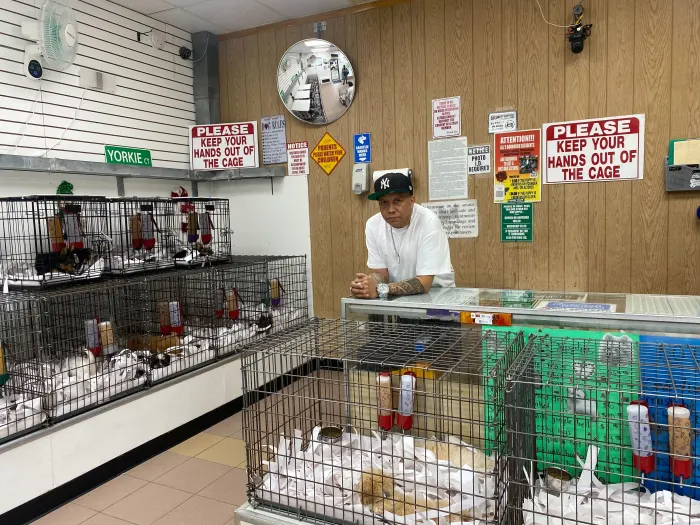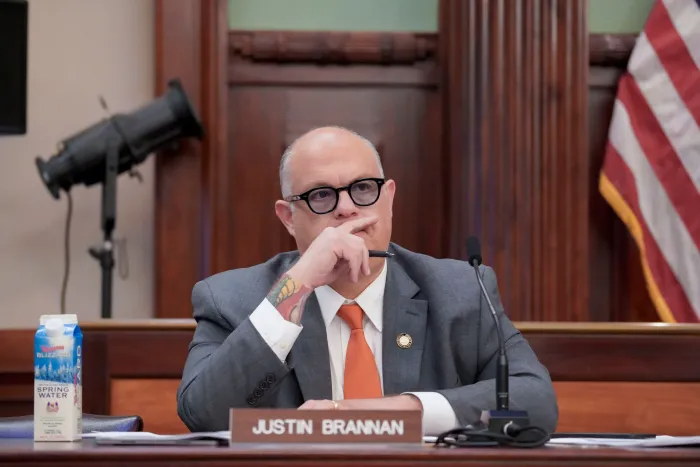Lauded by Activists, Sale Ban Could Shutter Brooklyn Pet Stores
State and city pet-sale bans are intended to stop animal abuse at puppy mills, but pet-store owners predict it will make the problem worse.

Pet stores across New York City are banned from selling cats and dogs. Photo by Adam Daly
By Kirstyn Brendlen and Adam Daly, Brooklyn Paper
How much is that doggie in the window? The state says it’s not for sale.
Brooklyn’s pet store owners, known for selling furry friends, are hoping legal intervention will halt the statewide ban, which they say will be detrimental to business in the lead-up to the holiday season.
In December 2022, Governor Kathy Hochul signed a bill banning the sale of dogs, cats, and rabbits at retail pet stores, intent on improving the welfare of animals by ending the “puppy mill-to-pet store pipeline.”
The pet sale ban took effect Sunday, December 15, affecting over 160 brick and motor stores statewide, five of which are in Brooklyn. Any stores found to be selling pets after the deadline can face penalties of up to $1,000 per violation.

Last month, the City Council passed a similar bill — sponsored by Bay Ridge Council Member Justin Brannan — that would ban retail pet stores or other unlicensed locations from selling cats, dogs, and rabbits — with a fine for $500 per day if violated. It was also set to go into effect Sunday.
‘We’ll figure something out’
Benjamin Santiago, the general manager of Puppy Boutique in Bensonhurst, spoke to Brooklyn Paper last week, surrounded by some 20 pups he hoped would be sold before Sunday’s deadline.
“We’ll figure something out. These guys are not going to go back anywhere. They’re going to end up being in someone’s home. I’ll even grab a couple myself,” he said.
According to Santiago, Puppy Boutique has been on 17th Avenue for the last 30 years and employs about 12 workers, who are now concerned for their livelihoods.
He stressed that their pets come from reputable breeders inspected by federal authorities.

“I understand that they’re trying to cut off the puppy mills, but what does our pet store have to do with that?” asked Santiago. “The job of eliminating most of those puppy mills is for the FDA, they are supposed to handle that, not us. But it’s the mom-and-pop stores who are paying for it.”
The regulatory agency that handles inspections of facilities like dog breeders and puppy mills is the U.S. Department of Agriculture, not the FDA.
But some doubt pet store owners’ claims that their animals come from safe facilities — even if they get regular USDA inspections.
“The USDA is known as a joke in the animal rights world,” said Allie Taylor, a Brooklyn resident and founder of Voters for Animal Rights. “They turn their cheek the other way, if they see something, there’s minimal amounts of punishment for non-compliance. So there’s really no incentive for a puppy mill to do the right thing.”
At the worst of those facilities, often located states away from the Brooklyn stores where the puppies end up, adult dogs are bred forcibly and repeatedly, Taylor said, and kept in poor conditions without vet care.
Pets brought into New York State from across state lines must have a Certificate of Veterinary Inspection, and those certificates show where the animals came from. State records show that The Puppy Boutique received 59 new puppies in October, all from breeding facilities in Missouri.

Recent USDA inspections of those facilities found few violations — but several house dozens of dogs, per inspection reports. Hayden Otto, which sold The Puppy Boutique three puppies, housed 188 dogs as of June 2024 — 137 adults and 57 puppies. Triple P Kennel, where the store got three Pomeranians, had 122 dogs as of June 2024. In 2020, Brooklynites protested outside the store, claiming it had sold sick and dying dogs.
“Small-scale breeders don’t sell their dogs in pet stores,” Taylor said. “I certainly don’t support breeders, period, but I will say breeders who are doing this more ethically and not using puppy mills, but breeding one or two litters per year, they’re not selling their dogs to pet stores. They’re going right to consumers.”
Plugging the puppy mill pipeline?
Santiago believes that without reputable pet stores acting as a middleman for customers looking for young pets, many will fall for scams by deceptive breeders.
“After closing up all these stores, there’s going to be even more scams, and there’s going to be people out there selling puppies out of the trunk of their cars,” he said. “I understand the shelters want people to adopt older adults, but a lot of people, especially families with kids, they want puppies. They want the puppies to grow up with their kids.”
The Pet Advocacy Network, which on Monday joined six New York businesses as plaintiffs in a lawsuit against the ban, pointed to a similar 2019 law in California where reported puppy scams have surged.
CEO of the Pet Advocacy Network Mike Bober said legislators’ “refusal” to work with small businesses has forced them to ask the court to stop the ban “before more consumers, animals, and local businesses are seriously harmed.”

“Pet sale bans hurt pets, families, and small businesses,” said Bober. “The so-called ‘Puppy Mill Pipeline Law’ takes away longstanding protections for pet owners and leaves New Yorkers more vulnerable to fraudulent sellers on the unregulated black market, while doing nothing to stop bad breeders.”
As the deadline looms, Santiago feels the State has “screwed over” small pet stores like his, particularly in enacting the ban 10 days before Christmas. Despite the hard feelings, he hopes that the legal action seeking an injunction will save the business or at least be fruitful in giving pet stores some sort of Plan B.
Under the Puppy Mill Pipeline Act, state legislators want pet stores to partner with registered, nonprofit animal rescue organizations to showcase animals available for adoption. The law would allow pet stores to collect reasonable rental fees from rescue groups for space to showcase the pets in need of a home.
Puppy Boutique said it has no plans to partner with any rescues but will, in the meantime, fill its displays with pet supplies instead of animals.
Animal activists applaud the ban
As store owners bemoan the ban, animal rights advocates and shelter workers say it’s a win for animal welfare.
Pet stores are a valuable part of a community, said Will Zweigart, founder of Flatbush Cats and Flatbush Vet, and it’s important for pet owners to have physical storefronts to purchase their supplies from. But he feels the stores should sell only supplies.
“They have absolutely no reason selling or caring for live animals of any kind,” he said, including fish and lizards — which are not included in the bill.
While store owners say their animals come from reputable breeders, their sources are often “shady,” Zweigart said. But his concerns include the stores themselves, which often provide less-than-ideal conditions for dogs and cats.
“You can apply common sense to look and see whether, visibly, even just a visual inspection, you can tell that animals in pet stores are not being cared for and kept even at the standards that are required for animal shelters,” he said. “These are for-profit businesses. There’s a misalignment of incentives, and the animals are suffering as a result.”

Taylor also supported the bill’s ban on the sale of animals from residences, and said people looking to make some additional money often start breeding and selling dogs out of their homes. Those dogs are frequently dumped or surrendered to shelters by their new owners. Breeders themselves sometimes abandon dogs that don’t sell, she added.
Brannan, who introduced the citywide ban in the Council, said at a September 13 hearing that the city has a long way to go in terms of humane treatment of animals.
“I’m often the first to defend the fiery passion of animal activists when others assume that there’s some sort of ulterior motivation,” he said. “There is no ulterior motivation. We just all really, really care about animals and we want to get this right.”
Brannan’s bill also banned the sale of animals from residential buildings or other unlicensed places — an effort to end backyard breeding. Backyard breeders can produce hundreds of puppies per year, and often don’t provide proper living conditions and care for their animals.
Earlier this year, Attorney General Letitia James — whose office will be responsible for enforcing the state Puppy Mill Pipeline Act — secured a $300,000 settlement from a Long Island pet store that had lied to consumers about getting its dogs from puppy mills and had knowingly sold those dogs while they were critically ill.
The store, Shake-A-Paw, told customers it worked with “the most trusted breeders nationwide,” according to the settlement, but had actually purchased thousands of dogs from puppy mills. Dozens of puppies sold at Shake-A-Paw were infected with diseases including parvo, which is often fatal, and at least some of the dogs died shortly after they were purchased by customers.
The final nail in the coffin
For David Dietz, the owner of Puppy Paradise, which has been on Flatbush Avenue for some 45 years, the ban is the final nail in his retail business’s coffin.
The Marine Park store owner told this paper that after December 15, he will start winding down operations, which also include grooming services, boarding facilities, and pet supplies sales. He said the incoming ban would eliminate about 70 percent of the business’s income, making it nearly impossible to cover operating expenses.
“I had for 45 years, I worked for 25 years, personally, seven days a week for 25 years, I sacrificed my life, my family, and my health, and I sacrificed my wealth to build that business,” Dietz said. “After 45 years of doing this, it’s very hard to just stop and shut everything down.”
Once Puppy Paradise closes its doors, Dietz plans to move to a smaller facility to focus on his puppy party service. This service provides animals for children’s parties or other events, such as “destress rooms” at colleges and offices.
During the store’s first 20 years in business, Dietz said he employed about 20 workers to meet the demand for his services in southern Brooklyn. However, since competition popped up from other retail stores and kennel facilities, that workforce had to shrink down to about three staff members.
He said he was initially happy about the state’s desire to make the industry more compliant but feels the law that was passed only hurts small businesses like his. He anticipates the move will allow unlicensed sellers and breeders to thrive on the black market.
“They’re going to open up a whole ‘nother shrew of problems,” said Dietz. “People are people, and they want to try to make a living, and if there’s a demand, it’ll be filled by somebody somewhere.”
Like Puppy Boutique, Dietz questioned the push to partner with rescues and adoption agencies at this stage in the process and ultimately decided it would not be a viable solution for his business.
“The idea is great, but they have no funds to do it,” he said. “I’m paying $5,000 a month for rent. My electricity is $1,000 a month, insurance is about $400 a month, plus the employees are over $10,000, $12,000 a month. What shelter can afford to pay any part of that when they have to give the dogs away for $60 or $100 or $200?”
And if they have to care for the animals on top of it, Dietz said, rescuers will be “paying money that nobody has.”
“So will it work? No.”
How will the law be enforced — and where can New Yorkers get pets now?
The law will be enforced by the Attorney General’s office, which issued a reminder about the ban, and the fees associated with violating it, last month.
It was not immediately clear how exactly the AG’s office would ensure sales stop after December 15. In the Shake-A-Paw case, James began an investigation after receiving dozens of complaints from New Yorkers who had bought sick dogs from the store, according to court documents.
The citywide ban, if passed, will become the responsibility of the city’s Department of Health and Mental Hygiene — which already oversees pet stores and animal welfare.
Zweigart said he was curious about how strong that enforcement would be, and speculated that most pet stores, rather than proactively selling all their animals, would continue as usual until they get caught.

He, like many animal rescuers in New York City, felt critical of the DOH — especially after a September City Council hearing, during which department representatives told council members they don’t need more money for animal welfare programs.
“We expect our government agencies to do their job and fully enforce the law at the state and the city level,” Taylor said. “That said, I question how seriously our city and state agencies will take it, particularly the New York City Department of Health.”
She said Voters for Animal Rights would be implementing its own system, and ask that when locals report violations to the city or state, they also alert the organization, so it can keep track of issues and enforcement.
State and city officials and animal activists, in the face of the ban, have urged New Yorkers to adopt their pets from the city’s many overcrowded shelters and rescue agencies — not from unlicensed sellers, friends, or other breeders. In Brooklyn, prospective pet parents can check out Animal Care Centers of NYC, Sean Casey Animal Rescue, Flatbush Cats, or the Brooklyn Cat Cafe.
Editor’s note: A version of this story originally ran in Brooklyn Paper. Click here to see the original story.
Related Stories
- Brooklyn Animal Shelters Face Overcrowding Crisis
- A Gowanus Shelter for the Animals of Brooklyn
- Shop Cats of Brooklyn and Beyond Finally Get Their Due With New Book
Email tips@brownstoner.com with further comments, questions or tips. Follow Brownstoner on X and Instagram, and like us on Facebook.









What's Your Take? Leave a Comment